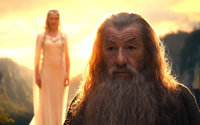Tolkien, the Hobbit and the medieval revolution
By Nicolas Bonnal

And he spoke many things unto them in parables,
Saying, Behold, a sower went forth to sow.
Matthew, 13, 3
The work of Tolkien remains a mysterious incentive and a living paradox: for no best-selling book is as anti-modern and hostile to present mass-culture and obsessive technology than the Lord of the Rings. Oxford professor's universe and manners turn resolutely the back to our values, our way of life, even our decorum. It barely despises and rejects them.
Was the success of our great initiate unpredictable? Of course not: our subculture is fond of monsters, dungeons, dragons, cruel warriors and mad magic kingdoms. And there is still room in the business for dissatisfaction. Dissatisfaction is a good in this world, it is an asset. And it has its numerous customers too, seeking parallel worlds in a techno unified-one. Of course dissatisfaction was more important fifty years ago; now the masses remain still, well-fed and they just content themselves with flocks of orcs, wizard's staffs and bizarre powers.
Yet Tolkien proposes a completely intrusive model: a medieval one. As a British catholic, conservative monarchist, and a technophobe somewhat anarchist, he is close to great pre-Raphaelite agenda or rebellious authors like Hilaire Belloc or Chesterton. They too rejected modern world, industrial revolution, nature devastation. This modern world produced the tsunamis which ravaged anything, it was not the nature. And Tolkien took refuge in a rather cool and quiet world full of magi and kings, Halflings, dragons and of course good beer. The hobbits' universe offers us a reminiscence of what Marx called the free peasant of England, before the world of enclosures and "the dark satanic mills" of William Blake eliminated this beautiful class. This is the wonderful Old England (as sung in British masterpiece opera, King Arthur, by restoration genius Henry Purcell), full of green, goblins, pints and meadows.
The hobbit represents thus the ideal of British conservative citizen, as we should say; a mix of yeoman and bohemian Tory. Of course Tolkien denounced any interpretation or parabolic meaning; and he was right to do so, since his message is rather obvious, isn't it?
The style of Tolkien is rather impulsive and polemic, and since the foreword of the Lord of the rings. Think of it:
Hobbits are an unobtrusive but very ancient people, more numerous formerly than they are today; for they love peace and quiet and good tilled earth: a well-ordered and well-farmed countryside was their favourite haunt.
Deep roots, cooking, gardening and unobtrusiveness are the breasts of England -and of any rural country of course! The model of Tolkien contains somewhat the schemes of a medieval revolution, as devised by Chesterton in his Don Quixote or Belloc in his path to Rome. Knowing that we cannot control a machine, that a machine will always control us, think of the cars, computers, TV, Tolkien rejects technique, as great American thinkers like Mumford (the world of Sauron is the mega-machine, isn't?) or Boorstyn. Writes our author:
They do not and did not understand or like machines more complicated than a forge-bellows, a water-mill, or a hand-loom, though they were skilful with tools.
Who are the hobbits? I thought before that they were like children, now I would say that they are the former British people or the traditional peasants of Europe; they are closer to the ground, this is why they are what we were. And the hobbits are close too to the Russian country-men of the Mir. Think of the décor and costumes of Peter Jackson's LOTR, completely inspired by Byzantine, orthodox and Russian (Vasnetsov) painters! And watch or discover the masterworks of soviet directors like genius Russian Disney Alexander Ptouchko or Alexander Rou, who was even Irish-born! The Rohirrim riders came from Russian steppes. Compare too Peter Jackson's Argonaths to the Russian warriors in Ruslan and Ludmila. There're the same.
The hobbit, this man of lore, this folk-lore, individual of a people of the past, flees modern people:
Even in ancient days they were, as a rule, shy of "the Big Folk", as they call us, and now they avoid us with dismay and are becoming hard to find... They possessed from the first the art of disappearing swiftly and silently, when large folk whom they do not wish to meet come blundering by; and this art they have developed until to Men it may seem magical.
The qualities of the hobbits are connected to the ground and to the earth. Tolkien hates the bowels of the earth, yet he adores her surface. Sticking to her is a warrant against modern madness, against may be any degeneracy. Tradition, experience and practice are the secrets of a wonderfully achieved life:
But Hobbits have never, in fact, studied magic of any kind, and their elusiveness is due solely to a professional skill that heredity and practice, and a close friendship with the earth, have rendered inimitable by bigger and clumsier races.
The medieval revolution, as described by Belloc or Mumford, as dreamt later by the hippies fond of Frodo in the sixties, includes too a king, played by the friend Strider, who had to return; a capacity to self-defence and organize a militia (I will study further this important trait neglected by the movie) against aggressive invaders; a dream too of the golden age that has to return around the end of times. This is what happens after the scouring of the shire: the hobbits re-establish a golden age.
Altogether 1420 in the Shire was a marvellous year. Not only was there wonderful sunshine and delicious rain, in due times and perfect measure, but there seemed something more: an air of richness and growth, and a gleam of a beauty beyond that of mortal summers that flicker and pass upon this Middle-earth. All the children born or begotten in that year, and there were many, were fair to see and strong, and most of them had a rich golden hair that had before been rare among hobbits.
This marvellous year of 1420 looks like Virgil and his famous Novus Ordo Saeclorum, the new order of the centuries which we'll have to comment and explain too. As we know the isolated agenda of the hobbits is not far from the global destiny of all and the most sinister conspiracies.
Therefore speak I to them in parables: because they seeing see not; and hearing they hear not, neither do they understand.
Matthew, 13, 13
Nicolas Bonnal
Subscribe to Pravda.Ru Telegram channel, Facebook, RSS!





